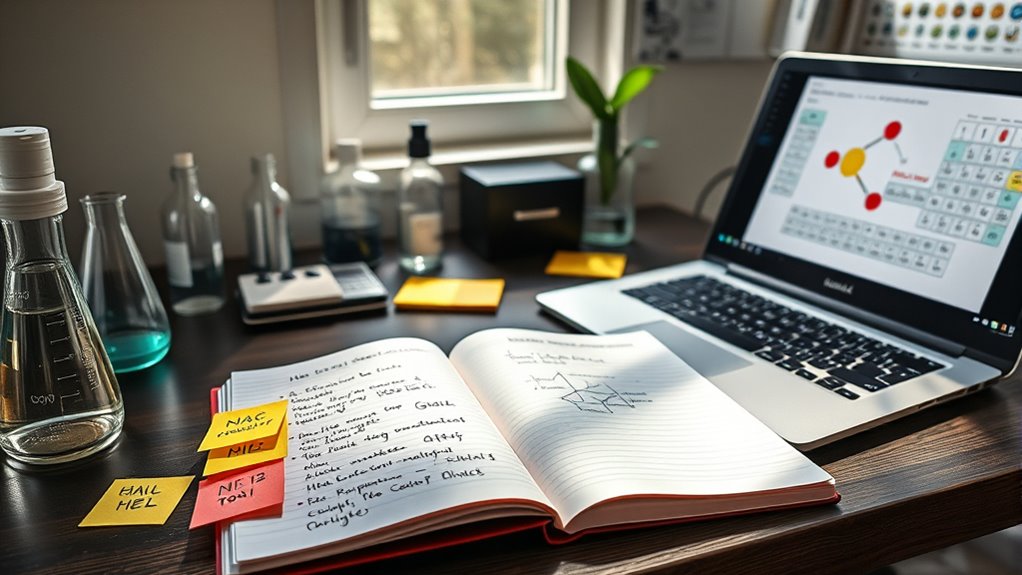To build a personal learning plan in chemistry, start by evaluating your current knowledge and identifying weak areas. Set clear goals and create a structured schedule that balances study time with breaks. Use diverse resources like practice problems, videos, and summaries tailored to your learning style. Organize your materials and regularly review progress, adjusting strategies as needed. Keep refining your plan to stay motivated and on track for mastery—there’s more to discover beyond this initial framework.
Key Takeaways
- Assess current chemistry knowledge to identify weak areas and set specific, measurable learning goals.
- Develop a structured schedule balancing study sessions, practice problems, and regular breaks.
- Choose diverse, trusted resources aligned with your learning style, such as videos, textbooks, and flashcards.
- Organize and review study materials systematically, creating summaries and quick-reference guides for efficient review.
- Monitor progress regularly, adjust strategies as needed, and celebrate milestones to stay motivated and improve mastery.

Are you ready to take control of your chemistry learning journey? Building a personal learning plan starts with understanding how to develop effective study strategies and manage your resources efficiently. You’ll want to tailor your approach to fit your unique learning style, making sure every effort counts. Start by evaluating your current knowledge of chemistry topics, identifying areas where you struggle most, and setting clear, achievable goals. This will give you direction and help you prioritize your study sessions.
Next, focus on creating a structured schedule that balances study time with breaks. Consistency is key; dedicating specific blocks of time each day or week ensures steady progress. When planning these sessions, incorporate diverse study strategies—such as practice problems, flashcards, or teaching concepts to someone else—to reinforce your understanding. Active engagement helps solidify concepts far more than passive reading or listening. As you implement these strategies, remember resource management is vital. Use quality materials like textbooks, online tutorials, and chemistry apps, but avoid overwhelming yourself with too many sources. Instead, select a few trusted resources and stick with them, maximizing their potential through regular review and application.
Additionally, understanding how to assess the freshness of your resources, like checking the reliability of online content, can help ensure you’re using accurate and current information. To make your study sessions more effective, organize your resources in a way that’s easily accessible. Digital folders, note-taking apps, or physical binders can help you keep track of important formulas, concepts, and practice questions. Use these tools to create concise summaries and cheat sheets that you can quickly review before exams. Incorporate different types of resources—videos for visual learners, practice problems for hands-on learners, and detailed notes for those who learn best through reading—to diversify your approach. This tailored resource management prevents burnout and keeps your study routine engaging.
Regularly evaluate your progress to determine what’s working and what isn’t. Adjust your study strategies accordingly—if a particular method isn’t helping you grasp certain concepts, try a different approach. Set milestones to track your improvement, like mastering a chapter or scoring higher on practice tests. Building a personal learning plan isn’t a one-time task; it’s an ongoing process that evolves as you learn more about your strengths and weaknesses. By managing your resources wisely and adopting effective study strategies, you’ll develop a more confident and efficient way to learn chemistry. Over time, these habits will help you build a strong foundation, making complex topics more manageable and your goals more attainable.
Frequently Asked Questions
How Often Should I Update My Personal Learning Plan?
You should update your personal learning plan regularly, ideally every 4 to 6 weeks. This allows you to assess your progress, make necessary plan revisions, and refine your goals. As you gain new insights or face challenges, revisiting your plan keeps it relevant and effective. Consistent goal setting and plan revision guarantee you stay motivated and on track to master chemistry concepts efficiently.
What Resources Are Best for Self-Assessment in Chemistry?
Did you know that 85% of students find self-assessment effective? For chemistry, quizzes and flashcards are excellent resources to test your knowledge regularly. Peer assessments also provide valuable feedback and help identify areas for improvement. Use these tools consistently to track your progress, reinforce learning, and build confidence in your understanding of complex concepts. Combining these methods guarantees a thorough and effective self-assessment strategy.
How Can I Stay Motivated During Challenging Topics?
To stay motivated during challenging topics, join a study group to gain support and new perspectives, which keeps you engaged. Additionally, establish a reward system for milestones reached, like finishing a difficult chapter or mastering a concept. Celebrating small wins helps maintain your enthusiasm and momentum, so you stay focused and motivated even when chemistry gets tough. Keep pushing forward—you’ve got this!
What Strategies Work for Balancing Chemistry With Other Subjects?
Balancing chemistry with other subjects might feel like juggling flaming torches, but with smart study schedules and effective time management, you can master it. Prioritize tasks, set specific goals, and allocate dedicated time for each subject daily. Use tools like planners or apps to stay organized, and don’t forget to schedule breaks. This approach keeps your workload manageable, helping you excel in chemistry without neglecting other subjects.
How Do I Measure My Progress Effectively?
You can measure your progress effectively by using self-assessment techniques regularly, like quizzes or explaining concepts aloud. Track your progress by keeping a journal or digital log of topics you’ve mastered and areas needing improvement. Set specific, measurable goals and review them weekly. This active approach helps you stay focused, identify gaps, and celebrate achievements, ensuring you’re consistently moving forward in your chemistry learning journey.
Conclusion
By crafting your personal learning plan in chemistry, you’re taking control of your education and future. Remember, even Picasso started with basic sketches—your journey begins with small, deliberate steps. Keep your curiosity alive, stay adaptable, and don’t be afraid to embrace new methods, like using a vintage quill for notes if it sparks joy. With dedication, you’ll turn your chemistry dreams into a reality, proving that progress isn’t just about the past but what you build today.









